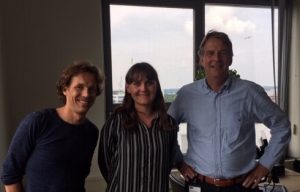Developing a ‘yes-no’ pathway for patients presenting with vague abdominal symptoms in primary care
Nanna Holt Jessen, PhD student at the Research Centre for Cancer Diagnosis in Primary Care at the University of Aarhus shares her experiences of visited the CanTest team at the University Medical Center in Utrecht, as part of the ongoing CanTest Travelling Fellowship Scheme.
 “A CanTest Travelling Fellowship gave me the opportunity to visit Professor Niek de Wit and his team at the Julius Center for Health Sciences and Primary Care in Utrecht in the Netherlands, for a month over the summer, to work on early cancer diagnostics.
“A CanTest Travelling Fellowship gave me the opportunity to visit Professor Niek de Wit and his team at the Julius Center for Health Sciences and Primary Care in Utrecht in the Netherlands, for a month over the summer, to work on early cancer diagnostics.
The stay was initiated in collaboration with CanTest as part of the PhD degree programme at the Graduate School of Health at Aarhus University in Denmark, where I am currently enrolled. All PhD students are recommended to go abroad for a research stay to benefit from the expertise in a different research environment.
Visiting Professor Niek de Wit and Assistant Professor Charles Helsper at the Julius Center gave me the opportunity to achieve further knowledge on the scientific theories behind cancer diagnostics, and I additionally learned a lot about health science research in the Netherlands. The stay exceeded all my expectations. The visit was educative, inspiring and extremely interesting, and I met so many researchers and experienced general practitioners (GP) who were more than willing to share their knowledge. I was also invited to participate in one of their research groups, which included another PhD student working on abdominal cancer diagnostics. I had the opportunity to discuss my research and the implications related to diagnosis of abdominal cancers and other serious abdominal diseases in primary care. Furthermore, I gained new perspectives on cancer diagnostics seen from a Dutch GP perspective, and I discussed the management of gastro-intestinal symptoms in primary care with several researchers and GPs.
 The overall aim of my PhD project is to develop an abdominal ´yes-no´ pathway for primary care patients with vague and nonspecific abdominal symptoms in whom the GP suspects abdominal cancer. Research has shown that 30% of all cancer patients initially present with vague symptoms to their GP. The abdominal ´yes-no´ pathway was developed during 2018, and a clinical feasibility, study giving GPs direct access to the pathway in part of the Central Denmark Region, is currently being conducted in Denmark.
The overall aim of my PhD project is to develop an abdominal ´yes-no´ pathway for primary care patients with vague and nonspecific abdominal symptoms in whom the GP suspects abdominal cancer. Research has shown that 30% of all cancer patients initially present with vague symptoms to their GP. The abdominal ´yes-no´ pathway was developed during 2018, and a clinical feasibility, study giving GPs direct access to the pathway in part of the Central Denmark Region, is currently being conducted in Denmark.
Niek de Wit has worked with early diagnosis in cancer for many years, having started his research career by exploring the implications of open access investigations from general practice. It was very interesting to discuss my project and the pathway with him and Charles Helsper. The different approaches used in the Netherlands compared to Denmark were a recurring topic in our discussions.
I am truly grateful for being offered this opportunity and would like to thank CanTest and all the kind people I met at the Julius Center. I had an excellent stay in Utrecht, and the visit opened the way to many international contacts that will be invaluable in my future work in both academia and clinical practice.”
The CanTest Travelling Fellowships are designed to support visits by Junior Faculty to partner CanTest institutions, or to attend conferences and courses. The aim is to enhance research skills and expertise in early detection research, as well as fostering links and collaborations across international boundaries.


